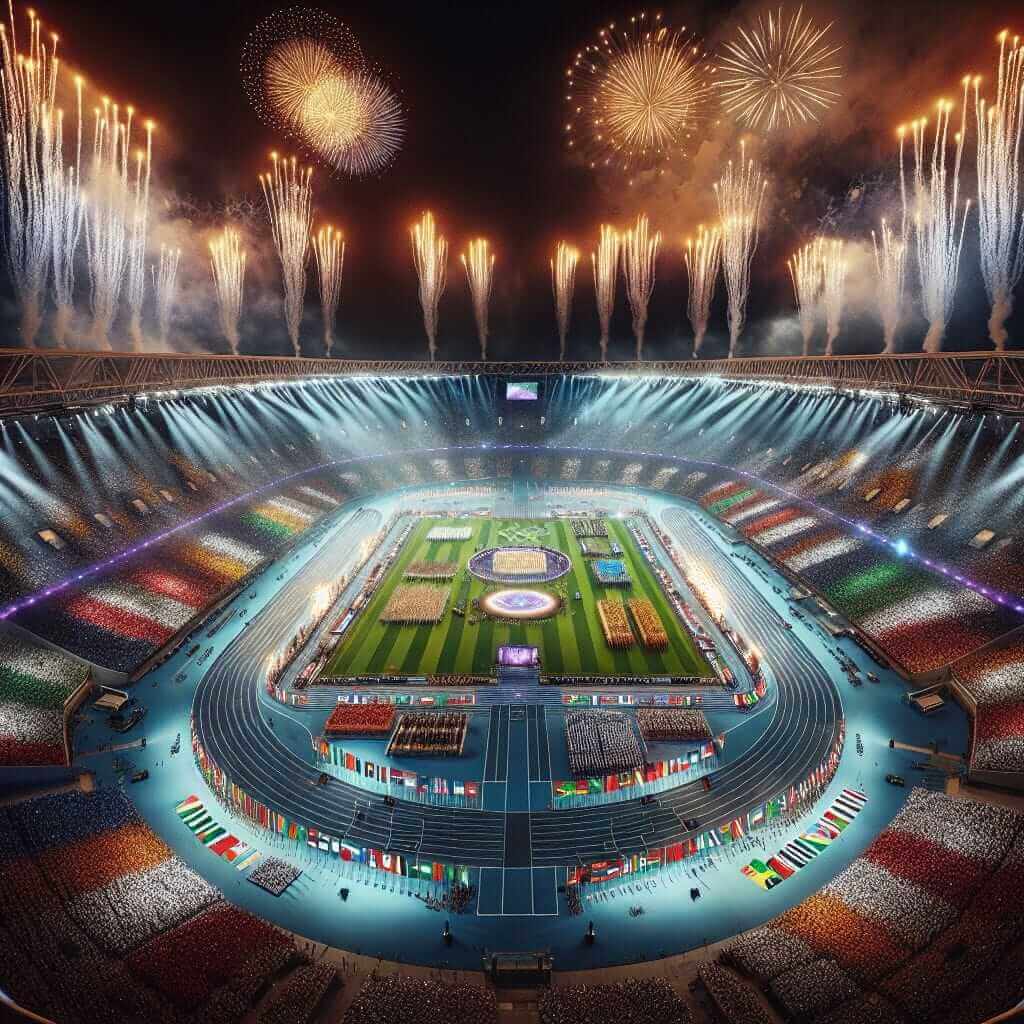Global sporting events like the Olympics and the FIFA World Cup are more than just competitions; they hold significant geopolitical weight and can impact international relations in profound ways. This often appears as an essay topic in the IELTS Writing Task 2, requiring you to analyze the complex relationship between sports and global politics.
Here are some potential IELTS Writing Task 2 questions related to this topic:
- Some people argue that global sporting events are detrimental to international relations, while others believe they foster peace and cooperation. Discuss both sides and give your opinion.
- To what extent can global sporting events be used as a platform to promote political agendas? Illustrate your answer with examples.
- Many believe that hosting global sporting events brings more drawbacks than benefits to a country. Do you agree or disagree?
Sample Essay: Global Sporting Events and International Relations
Let’s choose the first question to demonstrate a sample essay:
Some people argue that global sporting events are detrimental to international relations, while others believe they foster peace and cooperation. Discuss both sides and give your opinion.
Analysis
This is a classic “discuss both views” essay question. You are expected to:
- Present both sides: Explain why some people believe global sporting events are harmful to international relations and why others think they are beneficial.
- Give your opinion: State whether you agree that sporting events are largely positive or negative for international relations, or if you hold a more nuanced perspective.
- Support your arguments: Use relevant examples, historical events, or hypothetical situations to justify your points.
Model Essay
Global sporting events, such as the Olympics and the FIFA World Cup, captivate billions worldwide and transcend geographical boundaries. While some argue that these events exacerbate existing tensions between nations, others contend that they offer a platform for dialogue and understanding. This essay will explore both sides of the debate before presenting the view that global sporting events, while not a panacea for international conflict, possess the potential to foster goodwill and cooperation.
On the one hand, critics point out that the intensely competitive nature of these events can heighten pre-existing political and historical animosities. National pride often reaches fever pitch, leading to jingoism and exacerbating rivalries. For example, the 1980 Moscow Olympics, boycotted by the United States and several other countries in protest of the Soviet invasion of Afghanistan, demonstrated how sport could become entangled in political disputes, ultimately hindering diplomatic efforts. Moreover, the immense pressure to succeed can lead some nations to prioritize national glory over fair play, resorting to unethical practices like doping scandals, which further erode trust and respect between countries.
On the other hand, proponents argue that global sporting events present a unique opportunity for nations to engage in peaceful competition and cultural exchange. The Olympic Games, with its emphasis on athletic excellence, fair play, and intercultural understanding, embodies this ideal. The gathering of athletes from diverse backgrounds fosters mutual respect and breaks down cultural barriers. Furthermore, these events can serve as a catalyst for diplomatic breakthroughs. The “ping-pong diplomacy” between the United States and China in the 1970s, initiated through table tennis matches, exemplifies how sport can pave the way for improved political relations.

In conclusion, although global sporting events are not immune to political manipulation and can, at times, escalate tensions, they nevertheless offer a valuable platform for promoting peace, understanding, and cooperation. The emphasis on shared values, such as sportsmanship and fair play, can transcend political differences and foster a sense of global unity. Therefore, while it is unrealistic to expect sport to single-handedly solve complex geopolitical issues, its power to bridge divides and foster a more harmonious world should not be underestimated.
(Word count: 325)
Writing Tips
- Structure: Follow a clear structure for a “discuss both views” essay: Introduction, Body Paragraph 1 (Side 1), Body Paragraph 2 (Side 2), Conclusion.
- Examples: Use specific examples to illustrate your points. Don’t just make general statements.
- Vocabulary: Use a range of vocabulary related to international relations, sports, and diplomacy.
- Grammar: Pay close attention to grammar and punctuation. Errors can lower your score.
Vocabulary
- Exacerbate (verb) /ɪɡˈzæs.ə.beɪt/: To make a problem, bad situation, or negative feeling worse.
- Jingoism (noun) /ˈdʒɪŋ.ɡoʊ.ɪ.zəm/: The extreme belief that your own country is always best, often shown in aggressive or warlike behavior.
- Panacea (noun) /ˌpæn.əˈsiː.ə/: Something that will solve all problems – often used to show that the speaker does not believe it really exists.
- Catalyst (noun) /ˈkæt.əl.ɪst/: Something that makes a change happen or happen more quickly.
- Transcend (verb) /trænˈsend/: To go beyond or rise above a limit, or be greater than something.
Conclusion
Understanding the impact of global sporting events on international relations is crucial for succeeding in IELTS Writing Task 2. By following the tips and strategies outlined in this guide, you can effectively analyze the topic, develop compelling arguments, and present a well-structured and vocabulary-rich essay. Remember to practice regularly using diverse question prompts to improve your writing skills and boost your confidence for the exam.